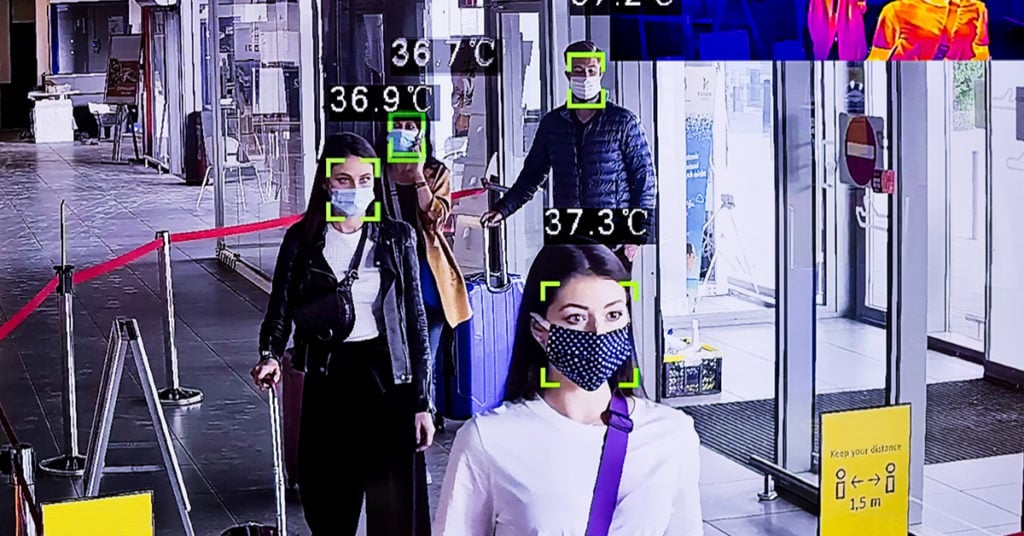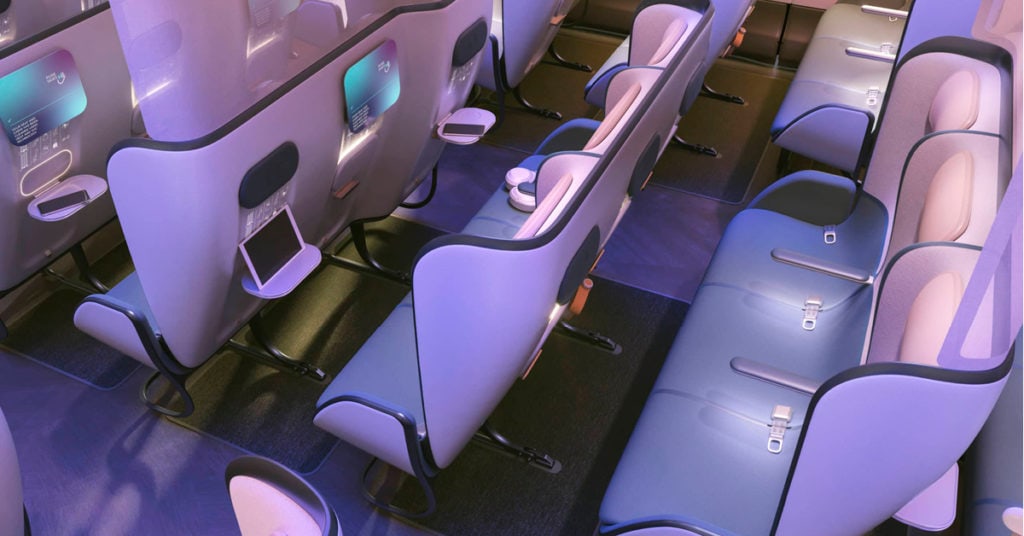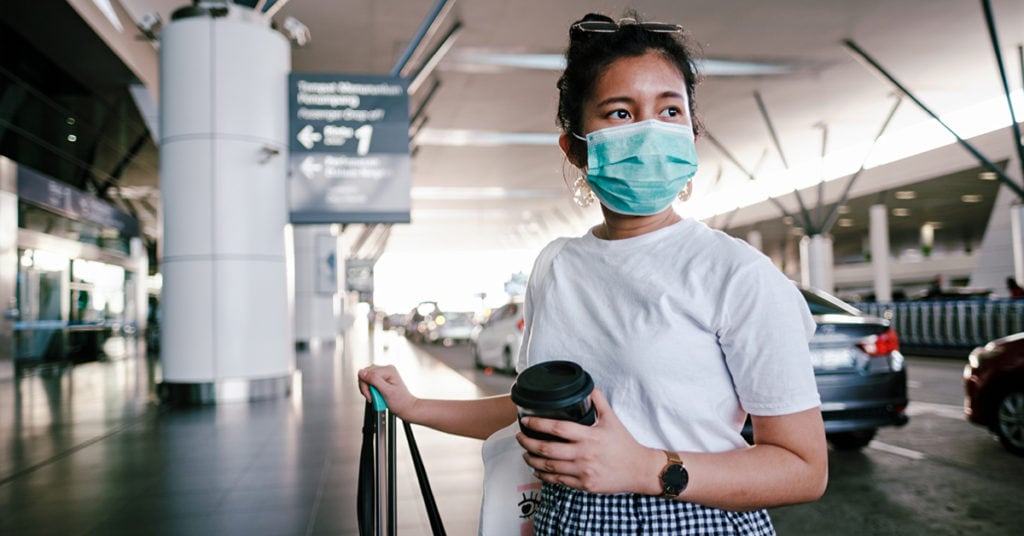Most airline professionals agree that the industry will emerge from the COVID-19 outbreak fundamentally altered. Experts identify what changes might be here to stay.
During a virtual event hosted by APEX and Inmarsat at the end of April this year, aviation executives and professionals were asked if the airline industry would survive the COVID-19 crisis. The consensus? Yes, but fundamentally changed. From health visas to airline subscriptions, here’s what some of these changes may entail.
Out of Business
The pandemic has redefined travel. Business and leisure have been swapped for essential and non-essential. Domestic has usurped international. Zoom stands in for any room. Most people who plan to travel are doing so to visit friends and family, finds a recent poll by the International Air Transport Association (IATA). Vacations come in a close second. Work trips finish last.
In line with these findings, experts expect personal travel to bounce back first. The risk-averse business market will be less bullish – not just because of the widespread adoption of videoconferencing. The economic downswing caused by the 2008–2009 global recession was enough to curb business-travel levels for five years, three years more than it took international leisure travel to recover, according to research from McKinsey & Company. A pandemic compounds financial insecurity with corporate liability.
Duty of care, occupational health and safety requirements, disability designations and public-relations risks all stand in the way of putting an employee on a flight. The withdrawal of the roadwarrior dollar from travel and hospitality puts an up to $1.4 trillion dent in the sector’s bottom line, based on 2018 figures. For airlines, that void is almost existential: Corporate customers account for somewhere between 55 and 75 percent of revenue. And a lot of it may never come back. Both Delta Air Lines chief Ed Bastian and former American Airlines head Robert Crandall have said as much.

Here to Workstay
The travel bug is as virile as any virus. For now, afflictions of wanderlust or burnout are being treated at the local level. Tourism boards from Ireland to New Zealand inspire staycations with slogans like “There’s no place like home.” Car and RV rentals spiked, with summer marking the revival of the road trip. Vacation-rental startup Airbnb reemerged from a bruising spring with “Work from anywhere” as its new tagline. In the United States, longer stays, petfriendly rentals and northern states are trending on the platform.
“A real fact is everybody’s working remote,” says Elizabeth Becker, travel journalist and author of Overbooked: The Exploding Business of Travel and Tourism. Twitter, Slack and Shopify pledged to allow out-of-office work indefinitely. Pinterest put down $89.5 million to unpin itself from a San Francisco office lease. Google will let employees work from home until at least July 2021, and Facebook plans for half of its staff to remain remote over the next five to 10 years. In the non-tech sector, French automaker Groupe PSA plans for offsite work to stay in effect for non-production staff.
This shift has contributed to something of an urban exodus, leading many to ring the death knell on expensive cities like London, San Francisco and New York. According to Fortune Analytics, 11 percent of US adults living in urban areas are more likely to move out of their city or county in the next 12 months. “That’s going to affect travel,” Becker says. “I don’t know how, but I think it very much will.”
Beyond Borders
Countries, regions and cities with the cleanest bills of health will offer a new glint of appeal to international travelers when they reopen. At its peak, more than 80 countries rolled up their welcome mats to shut out the spread of the virus. Some nations put down the drawbridge, only to pull it back up again. Others have relaxed borders, but with strings attached.
“Quarantine is a demand killer,” said Alexandre de Juniac, director general and CEO of IATA, at a recent press briefing. As an alternative, de Juniac and other industry groups advocate for entry or exit COVID-19 tests to expedite the screening process. Governments have explored travel bubbles or “corona corridors” that open entry to certain countries. But it’s proven hard to ward off outbreaks. The “trans-Tasman bubble” between Australia and New Zealand, for example, has yet to be fully realized. “When I talk to people inside governments, the timbre of conversation moves more toward opening up safely versus picking and choosing who can and can’t come in,” says Max Tremaine, CEO and co-founder of Sherpa, a leading provider of travel requirements. According to Tremaine, regions are rapidly adopting digital forms, with 117 countries now offering eVisas or eTAs, and 78 with eHealth declarations.
“Travel documents are actually a big opportunity,” says Tremaine. “It’s an experience opportunity for the traveler, but also an ancillary revenue opportunity for airlines.” With Sherpa’s tools, travel operators can display up-to-date requirements and allow travelers to add required eVisas to their cart while booking tickets, a service currently offered by American Airlines.Prebooking integration lets customers filter searches based on restrictions and nationality, and opt in to be notified when a preferred destination permits entry.
But the greater value may lie in being a purveyor of clarity. “People are crying out for certainty, and if the airline can provide that, that’s valuable,” says airline pricing expert Oliver Ranson. In lieu of full certainty, flexible rebooking policies may linger longterm. United Airlines, American and Delta plan to cancel domestic change fees for good. Other carriers such as Emirates and Virgin Atlantic offer added assurance with free global COVID-19 coverage.

Subscription Refill
The pandemic sent the old airline revenue management model on a one-way ticket to irrelevance. “We’ve had a real shock to the pricing industry,” says Ranson. “All the standard data sources and processes are no longer valid for taking decisions.” In unprecedented times, historical data and market indicators no longer provide reliable forecasts. Revenue departments are in search of new models, and some are looking to Amazon- and Netflix-style subscription models for inspiration.
China Eastern’s Fly at Will pass offers one of the first post-pandemic case studies for alternative pricing options. For a set price (roughly $500), the pass allows Chinese residents to book unlimited mainland economy fares on weekends through 2020. The pass became available on June 18. Two weeks and 150,000 passengers later, the program was halted due to sales exceeding expectations, reports market intelligence website TNMT. China Express, Spring Airlines and Hainan Airlines have since introduced similar passes.
Many airlines, including Lufthansa Group and Volaris, had similar offerings prior to the pandemic, but research from airline revenue management software provider PROS suggests subscriptions could be more viable in a post-pandemic economy. More than half of travelers polled expressed an interest in annual airline subscriptions for a flat fee. Add elite privileges and expect to see buy-in from 80 percent of travelers. Luxury travel company Inspirato aims to attract this demographic with its new Inspirato Pass.
“The airlines that are able to make good decisions based on understanding what people are going through on a human level when they decide to take flights are the ones that will perform better,” says Ranson. This opens the door wider for firms like Fethr, Migacore and Volantio that collect data on traveler sentiment and intent. What matters most is knowing what to do with the data, says Ranson, who founded Airline Transformation Department in April to advise airline clients along these lines.
While revenue teams tackle risk for travelers, Airbus venture Skytra could soon reinvent risk management for airlines. “The idea behind it is truly groundbreaking,” says Ranson. When it receives approval from the Financial Conduct Authority in the UK, which is expected by the end of the year, the trading platform will allow airlines to hedge ticket fare fluctuations much like they do fuel costs. “COVID-19 has proved the perfect use case for the Skytra Price Indices, as we have seen high increases of ticket price volatility across all geographies,” says a company spokesperson.

Paring Down
The coronavirus has already driven cabin reconfigurations in the name of hygiene and physical distancing. The middle seat still flies empty on some flights. Seats have been offboarded to fit onboard cargo. Dividers have been installed, hygiene kits distributed and masks made mandatory. “Even after COVID-19 has moved beyond the horizon, the focus on health and safety will remain for a generation — just as the impact of 9/11 on airline security remains concretely with us to this day,” says APEX/IFSA CEO Dr. Joe Leader. Will business-class seats disappear with business travelers? And what about reimagining seating divisions altogether as design consultancy PriestmanGoode proposes in its Pure Skies concept? Time will tell. In the meantime, some travelers are going private.
“With COVID-19, there’s a whole new definition around what it means to be comfortable when you’re flying,” says Alex Wilcox, CEO of JSX, a hop-on jet service that operates short-haul flights from private jet terminals in the US. Much of the comfort private and semi-private operators like JSX provide occurs preboarding, where crowded terminals are bypassed for exclusive hangars and TSA lineups are swapped for background checks and simple screenings. Jets with a maximum capacity of 30 passengers provide peace of mind that the odds of transmission are slimmer.
“Before the pandemic, private travel was mostly a question of time-saving. Now, there’s the added component of social distancing,” says Lukas Kaestner, head of Marketing, PR and Events for Hamburg Aviation. “This is something airlines might have to react to,” he says. JSX holds a codeshare agreement with JetBlue, while other airlines, such as Delta and Lufthansa, operate private subsidiaries. Since the pandemic, JSX, Lufthansa Private Jet and similar outfits have seen a rise in first-time and discretionary travelers.
With lean jets, fleets and operations, these carriers have an agile advantage over airlines hunkered down with bigger planes and obligations. “We’re able to react a lot more quickly than airlines that have hundreds of airplanes and sometimes tens of thousands of crewmembers,” says Wilcox. With many big airlines flying near-empty jets due to the thinned demand in the long-haul market, the rollout of the single-aisle A321XLR in 2023 could stir up mid-market competition between legacy, low-cost and upstart operators.
Sustainable Bailouts
IATA estimates that global passenger traffic will not return to pre- COVID-19 levels until 2024. But while the pandemic shook the travel industry to its core, a bigger challenge looms larger. “The further you think ahead, the more it comes to the sustainability question,” says Kaestner. “We have a situation in aerospace where we have to invest a lot of money over several years anyways, so why not do it right?” That idea has been shared by several governments, most notably in France and Germany, where bailouts have been underpinned with carbon contingencies.
“Without regulation, it’s a casino out there,” says Becker. She expects many national and local governments, especially in places once overrun by tourists, will take this downtime to rethink tourism mandates, bringing an end to the era of big tour buses and overtourism in many places. Ideas like “flight-free days” are no longer unfathomable either. “People are starting to realize that travel is a privilege, not a right,” she says.
“A Global Outlook” was originally published in the 10.4 November/December issue of APEX Experience magazine.


